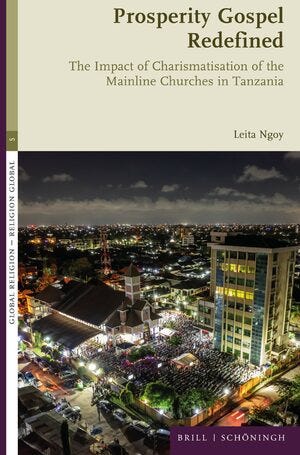Welcome to “Global Witness, Globally Reimagined.” You get a glimpse here of the kind of work that I do both at Church Mission Society and Missio Africanus where I help students of all levels (from unaccredited courses to PhD) explore the theological (and missiological) implications of the rise of World Christianity. In the newsletter, I focus on the subject of global witness in the twenty-first-century context. Every second Tuesday, I share a thought that has spoken to me, one or two resources that I trust will be helpful to you, and three exciting quotes about mission to give you something to think about as you go through your day. I pray one of these will energise you.
world.
1. Resources I am Enjoying
Book: [OPEN ACCESS] Leita Ngoy, Prosperity Gospel Redefined: The Impact of Charismatisation of the Mainline Churches in Tanzania (Leiden: Brill, 2025).
It is a well-known fact that African Christianity tends to be more open to the influence of the Holy Spirit than other expressions of the faith. Of course, African Christians are, generally speaking, acutely aware of the invisible world of spirits and how the spirits affect the material world in which humans live. (For many of us, the “spiritual” and the “material” are so closely intertwined that we cannot think of one without the other). This is straightforward — there is no controversy here. If you grow up among people who talk about spirits all the time, you will respond to the forms of Christianity that give you language and practices to help you understand your world in a Christian manner. For this reason, most African Christians expect God to be actively involved in their well-being — the spirits of their religious systems before converting to Christianity did this. As a matter of fact, it was the duty of their spirits (od the gods) to make sure they were well catered for. When they read the Bible, they find a God who is so happy to provide for people that one of God’s names is Jehovah Jireh. A God that is only interested in getting people to heaven would not make sense to many around the world. “If your god cannot help you in real and tangible ways while you live on earth — heal you as Jehovah Rapha does and protect you the same way Jehovah Nissi did for Israel — it is a useless god. Leave it and find one that will be there for you.” Only certain peoples, especially in the West, would find it difficult to ask God for things.
It is in this context that I would like to recommend the resource I am enjoying this month, Leita Ngoy’s new book, Prosperity Gospel Redefined. The book comes out of her doctoral thesis submitted to Ruhr University in Bochum, Germany, in 2022. Her research explored the impact of the charismatic faith (as evidenced in prosperity gospel) in a mainline denomination in Tanzania. In this slightly edited version of the thesis (that has now been published as a book), she makes a strong point; the typical dismissive response that many people in the West give to African Pentecostal and Charismatic Christianity, that it is all about prosperity gospel is both misguided and misplaced. What we have labelled a gospel of prosperity is, in many cases, not even about riches. More often than not, it is a theology of a people who know that God provides (and that God usually responds to people making sacrifices (giving to others including but not limited to their “men and women of God”) to have their “issues” resolved. Thus, there is something positively missional, transcultural, and contextual about believing in a God who provides. She is not naïve — she is aware of the abuse, deception, and extortion that happens in Africa as needy people look for God’s blessings, but she knows this is not an African problem. There is a great deal of capitalistic greed in the Western church as well. She also realises that a lot of what happens in prayer meetings is a misguided avoidance of responsibility and hard work — yes, most overnight prayers could serve the people better if they were night shifts. In the end, she suggests a new way of talking about this — mafanikio gospel (which, as far as I can tell, does not resolve the shortcomings of the label of prosperity gospel, but this failure is because the problems we have with the theology of prosperity are foreign (and are a result of miscontextualisation). She is a seasoned pastor, and she swears that God responded to her sacrifice with a blessing she could not buy anywhere in the world. She saw the same from numerous members of her denomination. As a result, she starts a very important conversation. She does this well while, at the same time, making it an African conversation. Those interested in the theological discourse about prosperity gospel will find this book helpful. And it is open access. You may download it at https://brill.com/display/title/69943.
Keep reading with a 7-day free trial
Subscribe to Global Witness, Globally Reimagined. to keep reading this post and get 7 days of free access to the full post archives.




